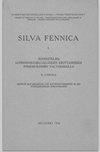Forest management in northern Fennoscandia: the need for solutions that mitigate conflicts during forest regeneration and increase the use of continuous cover forestry
IF 1.8
3区 农林科学
Q2 FORESTRY
引用次数: 0
Abstract
Today, conflicts often occur in northern Fennoscandia (also known as Sápmi) between forestry and reindeer husbandry. Continuous cover forestry (CCF) is requested by both reindeer herding communities and the general public and is becoming more common, but the forest industry criticizes CCF for lower wood production. Mechanical site preparation (MSP) increases regeneration success and, thus, increases wood production in CCF. To reduce the conflict between forestry and reindeer husbandry, MSP in Sápmi should destroy as little ground lichen as possible. Today, there are no solutions for gentle and lichen-adapted MSP in CCF. Thus, there is a strong need to develop and test new technical solutions that increase regeneration success in a lichen-adapted way during CCF in Sápmi. We suggest that MSP solutions be developed which are gentle, work selectively and function in shelterwoods, gap cuts, and selection cutting stands. We envision that these solutions could fill the gap between the desired adaptivity on the part of the reindeer herding communities and the desired efficiency on the part of the forest industry. Such MSP technology would contribute to increased acceptance of CCF in the forest industry, higher biodiversity, and considerably reduce the conflict between forestry and reindeer herding communities.芬诺斯坎迪亚北部的森林管理:需要解决方案,以减轻森林更新期间的冲突,并增加对连续覆盖森林的利用
今天,芬诺斯坎迪亚北部(也被称为Sápmi)经常发生林业和驯鹿畜牧业之间的冲突。连续覆盖森林(CCF)是驯鹿放牧社区和公众都要求的,并且变得越来越普遍,但林业行业批评CCF降低了木材产量。机械场地准备(MSP)增加再生成功,从而增加CCF的木材产量。为了减少林业和驯鹿畜牧业之间的冲突,Sápmi的MSP应该尽可能少地破坏地衣。目前,在CCF中没有解决温和和适应地衣的MSP的解决方案。因此,迫切需要开发和测试新的技术解决方案,以在Sápmi的CCF中以适应地衣的方式提高再生成功率。我们建议开发温和的、选择性工作的MSP解决方案,并在防护林、间隙采伐和选择性采伐中发挥作用。我们设想,这些解决方案可以填补驯鹿放牧社区期望的适应性与森林工业期望的效率之间的差距。这种MSP技术将有助于提高森林工业对CCF的接受程度,提高生物多样性,并大大减少林业和驯鹿放牧社区之间的冲突。
本文章由计算机程序翻译,如有差异,请以英文原文为准。
求助全文
约1分钟内获得全文
求助全文
来源期刊

Silva Fennica
农林科学-林学
CiteScore
3.50
自引率
11.10%
发文量
21
审稿时长
3 months
期刊介绍:
Silva Fennica publishes significant new knowledge on forest sciences. The scope covers research on forestry and forest ecosystems. Silva Fennica aims to increase understanding on forest ecosystems, and sustainable use and conservation of forest resources. Use of forest resources includes all aspects of forestry containing biomass-based and non-timber products, economic and social factors etc.
 求助内容:
求助内容: 应助结果提醒方式:
应助结果提醒方式:


